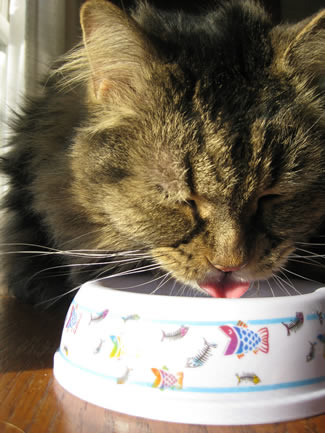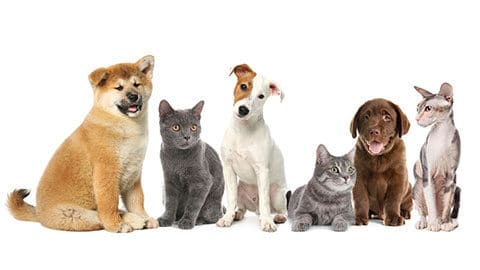Why is Menadione in Weruva?
This question came from Emi in Kent, Washington:
Hi! I just recently discovered you and your website when I was doing some online research on Weruva. I recently adopted a 10yr old cat from my local shelter. From the paperwork submitted from his previous owner, he was fed a dry food (or “kitty crack”) diet only. I am trying to incorporate some canned food and he is taking to the Weruva brand pretty well.
One thing I’d like more information on is the ingredient menadione bisulfite complex (also known as Vitamin K?). Weruva uses this in their seafood products, but I want to know if this really is an ingredient to avoid or not?
Can you enlighten me on this ingredient and is it safe for my cat?
Once again, Weruva owner David Forman jumped in with more information than Emi may have been expecting!
Regarding menadione, it is a form of vitamin k that is a required vitamin in fish based cat foods if the formula does not naturally contain enough vitamin k and if a manufacturer intends to label the formula as a complete meal. At this time, the pet food regulations do not permit the supplementation of different forms of vitamin k. We have removed menadione from non-fish formulas, though some cans may have old labels. None of the chicken or beef items contain menadione. Please see below for more information about menadione and how we believe our use of it in our fish based formulas best protects cats, and fish based formulas that do not contain menadione may expose cats to serious health risks.
Before our menadione input, I would like to note that we appreciate all inquiries, and we understand that there are many ingredients that are scrutinized. For instance, even now, the actual cans the foods go into are being scrutinized. . . Do they contain BPA? Ours cans do not contain BPA, though our fish formulas contain menadione. Would a customer buy the non-menadione can with BPA or do you buy the non-BPA can with menadione? In the face of all of these questions, we always urge a predominant focus on what is predominantly in the can. For instance, though our chicken formulas do not contain menadione, let’s assume that they do. Chicken accounts for approximately 50% of the formulas and when we use menadione it accounts for approximately 0.00005% of the formula (million to 1?). Our chicken is just the breast meat, it is boneless, antibiotic free, hormone free and free range. Brand X may be menadione free, but the chicken contains antibiotics, steroids, and the cuts uses are fat, skin, bones and a little meat (fat, skin and bones are not byproducts and are part of the definition of chicken). Which is better, the beautiful chicken which is 50% of the formula with menadione at 0.00005% in the can or the other formula with mystery chicken at 50% without menadione?
Below is an even more detailed response about menadione:
(1) AAFCO REQUIRES US TO PUT MENADIONE IN OUR SEAFOOD BASED CAT FOOD FORMULAS IN ORDER TO BE SUITABLE FOR EVERY DAY FEEDING
The vast majority of pet food does not require the supplementation of vitamin K in any form. However, according to AAFCO, cat food that contains at least 25% seafood on a dry matter basis must contain a certain level of vitamin K, and according to AAFCO, the only approved source of vitamin k is menadione.
peteducation.com/article.cfm?cls=1&cat=1399&articleid=657 (stating “Vitamin K does not need to be added unless diet contains greater than 25 percent fish on a dry matter basis.”).
(2) In designing our formulas, we have worked with a nutritionist who has served on several AAFCO boards. When specifically discussing menadione with her, she responded via email, “A couple of websites, that do not seem to have much science behind them, are trying to pressure companies to not use vitamin K3. So for fish items where there is clear evidence that vitamin K is important to the nutrition of the animal, they want you to put the animal at risk. The only form of vitamin K allowed in pet foods in menadione sodium bisulfite complex. So the K1 and K2 besides not being stable are not approved sources. Some companies have caved, but I strongly recommend that you don’t, especially when you are selling fish items.”
(3) **** MUST READ — For further information regarding menadione/k3 in pet food, please read “Vitamin K3 – is it unnecessary and toxic?” This industry expert states, “this notion that vitamin K3 as an ingredient in pet foods should not be used is unfounded” (petfoodindustry.com/ViewArticle.aspx?id=16414).
This article, written by Greg Aldrich, pHD, president of Pet Food & Ingredient Technology, Inc, details the accepted use of vitamin k3 in pet foods.
(3) Here is some insight as to why vitamin k is necessary for cats consuming seafood:
“Clinical signs of vitamin K deficiency have been observed in cats offered two commercial canned diets high in salmon or tuna.” Department of Molecular Biology, School of Veterinary Medicine, University of California, Davis 95616, USA. (ncbi.nlm.nih.gov/pubmed/8840252)

“Note that I am not overly concerned about menadione, a synthetic form of vitamin K that has many people worried (see The Dog Food Project, for example).” (dogaware.com/dogfeeding.html).
“There has been a lot of concern lately about the use of menadione, a synthetic form of vitamin K, in pet foods. Menadione has been banned for use in human over-the-counter supplements because it is toxic at excessive dosages. This problem was seen primarily in human infants when they were injected with vitamin K to prevent deficiency.
Since synthetic vitamin K has double the potency of natural vitamin K on a per weight basis, this resulted in toxicity. One nursing encyclopedia says that “prolonged consumption of megadoses of vitamin K (menadione) results in anemia,” and that “a daily injection of 10 mg of menadione into an infant for three days can kill the child.” It was this tragic discovery that led to its use being banned.
In comparison, the amount of menadione in commercial foods is extremely tiny. The Balance IT supplement, which is meant to supply nutrients at AAFCO recommended levels, contains 0.0774 mg menadione per scoop. One usage recommendation I’ve seen is to use 3 scoops for 900 calories (for a 35 lb dog), which would be 0.2322 mg daily. This amount is just over 2 percent of the dosage that would be considered toxic to a much smaller infant.
Many substances, even water, are safe in recommended amounts but toxic when excessive amounts are ingested. While I agree that the natural forms of vitamin K, phylloquinone (vitamin K1), and menaquinone (vitamin K2), would be preferable to the synthetic form, my feeling is that the risk presented by feeding foods or supplements that use menadione (vitamin K3) is minimal, and I would not avoid a food just because it contains this ingredient.” (dogaware.com/wdjhomemade6.html#menadione)
(5) Here is why vitamin k3/menadione began to be scrutinized:
“Prolonged consumption of megadoses of vitamin K (menadione) results in anemia, which is a reduced level of red blood cells in the bloodstream. When large doses of menadione are given to infants, they result in the deposit of pigments in the brain, nerve damage, the destruction of red blood cells (hemolysis), and death. A daily injection of 10 mg of menadione into an infant for three days can kill the child. This tragic fact was discovered during the early days of vitamin research, when newborn infants were injected with menadione to prevent a disease known as hemorrhagic disease of the newborn. Today, a different form of vitamin K is used to protect infants against this disease.” (enotes.com/nursing-encyclopedia/vitamin-toxicity)
(6) Here is how much menadione we use in our seafood formulas:
We use 0.00005% menadione in our formulas. That means in an 85g can, we have 0.00425g of menadione, or 4.25 mg. This is essentially over 3200 times less than toxic levels.
Also, oral vitamin K3 is water soluble, meaning, if it isn’t used, it is excreted. The known dangers of vitamin k3 involve heavy injections.
I have attached a few documents that indicate at what levels menadione is harmful. These documents state that menadione taken orally is toxic at 2500 mg/kg for mice and 4240 mg/kg for rats. Even taking the lower amount and applying it to a cat that weighs 5.0 kg (11 lbs.), that would mean that a cat would have to consume 13,750mg to suffer from toxicity. We are supplying 3200 times less than the toxic levels! (I may be misinterpreting or miscalculating the numbers, but the point is nonetheless the same. We are not even remotely approaching harmful levels).
(7) Natural Vitamin K based ingredients – Based upon our research and advice from nutritional consultants, we have learned that there may be “complete depletion” of phylloquinone, the main component of vitamin k, during food processing. Our food is cooked once, put in a can and sealed, and then cooked again in a retort process at high temperatures at extended periods of time in order to “sterilize” the product. Under ordinary heat treatment, vitamin k is relatively stable. However, we are not lightly cooking the food.
Please see this report on the stability of natural vitamin k:
http://www3.interscience.wiley.com/journal/118510171/abstract
An option we have considered is removing the menadione and labeling the formulas for intermittent feeding only. However, we certainly do not want to encounter a situation where a cat consumes too much of our fish formulas and experiences harmful side effects due to vitamin k deficiencies.
Thank you for the inquiry. I hope the above information was more helpful than confusing. Please let us know if you have further questions.
Best Regards,
David Forman
President and co-Founder
Weruva, Because Weluvya!

[iframe src=”//www.facebook.com/plugins/follow.php?href=http%3A%2F%2Fwww.facebook.com%2Ftraciehotchner&width=600&height=21&colorscheme=light&layout=button_count&show_faces=false&appId=178828585527299″ scrolling=”no” frameborder=”0″ style=”border:none; overflow:hidden; width:600px; height:21px;” allowTransparency=”true”]
photo credits: Charlie testing Purina ONE via photopin (license) & Kappy&his bowl via photopin (license)
Weruva is a sponsor on Radio Pet Lady Network, by our invitation.

